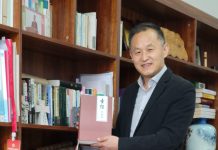
Shanghai, CHINA – The 9th International Seminar (2019), organised by the Shanghai Academy of Social Sciences (SASS) with the support of the United Bible Societies (UBS), focused on the theme of the Bible in relation to the Belt and Road Initiative (BRI). The sessions discussed impacts and contributions religions, particularly Christianity, made on cities and people in the BRI countries.
The Belt and Road Initiative (or BRI) is a global development strategy by China aimed at building a trade and infrastructure network connecting Asia with Europe and Africa along the ancient trade routes of the Silk Road. The objective of the BRI is to improve regional integration and increase trade thereby stimulating economic growth and prosperity for all.
In giving his opening address, Wang Zhen, Vice President of SASS, said that having such discussions on religious issues arising from BRI countries was meaningful and valuable since the countries under the BRI have diverse religious cultures.
Providing a perspective from the Foreign Affairs Office of Shanghai Ethnic and Religious Affairs Commission, Director Xu Yanbin agreed that the seminar provided a good platform for mutual benefits through cultural exchanges. He also encouraged more Christian Churches and Christians to contribute to this interaction.
Representing National TSPM, Secretary General Gu Mengfei spoke on behalf of Chairman Rev Xu Xiaohong, at the opening ceremony. He said that the theme of this seminar was appropriate as BRI is closely related to the spread of Christianity and God’s Word in China, adding that “the Church of China will continue to promote friendly exchanges with churches in countries and regions along the BRI based on the principle of mutual respect.”

“We wish to look at how the Christianity, and other religions, have contributed positively to the ‘welfare of the cities’ and the well-being of the people in the countries covered under the Belt and Road Initiatives, and have promoted the friendly exchanges and relationships between nations – historically and presently,” said Dr Cristian Romocea, from British and Foreign Bible Society, one of the key sponsors of the seminar.
Bishop John Chew, Honorary Consultant, UBS China Partnership, said that the ancient silk road also serves as a spiritual silk road fostering the exchange and spread of religious faith among the people along the road. He also shared that in the Bible, love, justice, kindness, love for neighbour, care for the marginalised, peace and other such principles of love are the basis for community building which are needed for the BRI development.
The special guest speaker of the seminar was Prof Li Kaisheng, the Vice Director of SASS’s Institute of International Relations. Prof Li gave a brief introduction to the challenges and future of BRI in the connected world and said that “religion is an important area of cooperation, a vehicle for cross-cultural communication and mutual learning across civilisation.”
The seminar’s keynote speaker was Prof Zheng Xiaoyun, Director of the Institute of World Religions, China Academy of Social Sciences. Prof Zheng shared on findings from research studies relating to existing ethnic-religious contributions and conflicts created along the BRI countries. She also discussed potential benefits and problems that might arise.
Many session speakers talked about the various impact of religion on countries and cities in BRI. Prof Choong Chee Pang, Honorary Consultant from UBS China Partnership, looked at the Biblical theology of shared future for mankind and put BRI in a broader perspective of God’s plans and purposes for all.

Like previous years, the seminar concluded with lively dialogue sessions engaging students from three different seminaries in China.
Mr Kua Wee Seng, UBS China Partnership Director, thanked God for sustaining and blessing the International Seminar on the Bible for nine consecutive years, which the Chinese organisers and leaders recognised as extraordinary, especially given the challenging situations in recent years. He paid tribute to Prof Yan Kejia, the Director of Institute of Religious Studies, SASS, for his vision and perseverance in initiating and organising these Seminars over the past nine years, together with the strong support of the Chinese authorities, academia and churches. Mr Kua also thanked the British Bible Society and the Bible Society Australia for their faithful support and partnership in these Seminars.
Due to the Covid-19 pandemic, the 10th International Seminar, that was to be held in November 2020, could not take place as planned. For more photos on the 9th International Seminar held in 2019, do visit our Facebook page.
Story: Pamela Choo
Photo: UBSCP
2020 © United Bible Societies China Partnership







